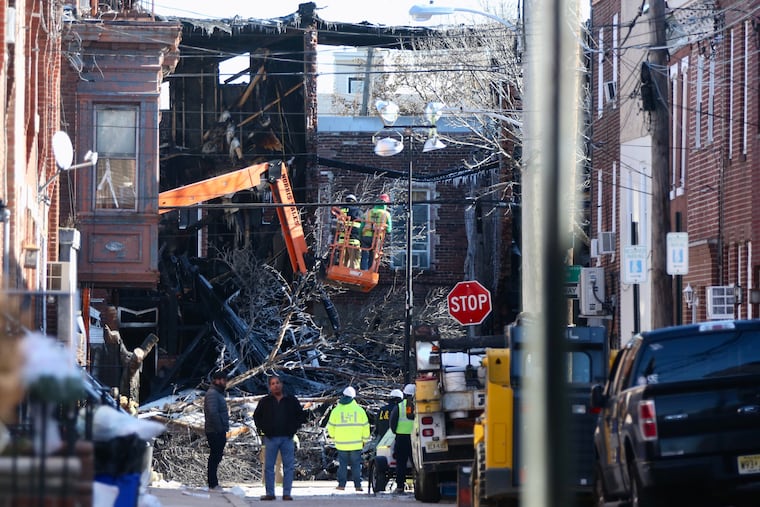South Philly explosion caused by crack in gas main, officials say
An investigation into exactly how the crack formed in the 92-year-old pipe remains ongoing.

Officials say a crack in a 92-year-old natural gas main led to the explosion that devastated a South Philadelphia block last month, killing two people, destroying five rowhouses, and forcing the evacuation of 60 residents.
An investigation by the Pennsylvania Public Utility Commission into the underlying cause of the crack is ongoing, Fire Commissioner Adam Thiel said at a news conference Thursday.
By Dec. 23, four days after the explosion, Philadelphia fire marshals had determined a crack in the gas line, causing natural gas to leak, led to the blast, Thiel said. The state commission’s in-depth investigation is now “exploring the cause and circumstances surrounding this incident, along with whether there are any violations of state or federal pipeline safety regulations," according to a statement from the agency.
That investigation could take a year or longer, the commission said.
Before Thursday, city officials had mostly declined to comment on what caused the Dec. 19 fire and explosion. Witnesses described a strong odor of gas after the blast and Thiel had described the blaze as “gas fed,” but officials had not confirmed the incident was gas-related.
The cracked six-inch cast-iron main, located in front of the damaged homes on the 1400 block of South Eighth Street, was built in 1928, said Douglas Moser, Philadelphia Gas Works executive vice president and acting COO.
There was no indication the pipe was leaking prior to the explosion, and no one had reported an odor, Moser said. He said gas pipelines can crack from tree roots growing underneath the pipe or from moving ground creating stress on the line.
About half of PGW’s 3,024-mile distribution system consists of cast-iron mains, which grow brittle with age, and in 2016, the utility sped up efforts to replace its riskiest pipes. Last year, it replaced about 34 miles. PGW has more cast iron, and more leaks, than any other gas utility in the state, according to regulators.
The explosion occurred in the late morning, and the sound from the blast was heard blocks away. Three rowhouses collapsed, two more were severely damaged, and a three-alarm blaze followed, sending smoke billowing into the air that was seen and smelled across South Philadelphia.
Neighbors and first responders attempted to save a trapped man but weren’t successful.
» READ MORE: After rowhouses exploded, neighbors rushed to help: ‘It’s really a South Philly thing’
Killed were Brian Diu, 28, who lived in one of the homes leveled by the blast, and Rudy Kambong, 65, who was bedridden and lived in a home adjacent to the rowhouses that collapsed entirely.
No other major injuries were reported and no first responders were hurt in the lengthy recovery and cleanup.
» READ MORE: He wore a Phillies cap and V-necks. The South Philly explosion destroyed all physical mementos of him.
Excavation efforts went on for days and neighbors have experienced a drumbeat of activity on the street since the explosion. Pavement removal and backfilling on the block is slated to begin Tuesday and expected to last a week, said Water Commissioner Randy E. Hayman.
Some have questioned whether work before the blast contributed to the problem.
In the days after the incident, city officials confirmed that in the months prior, crews had dug up the street in front of the homes that collapsed. City spokesperson Deana Gamble said leaks and an October cave-in had been repaired and backfilled in November, weeks before the explosion.
At the time of the explosion, there were no open Water Department work orders or service requests on the block, Hayman said Thursday.
After the explosion, the block’s water main, constructed in 1859, has experienced multiple breaks, Hayman said, causing residents to lose access to water. Water service was fully restored to the block earlier this month, he said.
During the news conference, frustrations boiled over from residents who said they’ve been largely kept in the dark about the conditions on their block.
Matt Allen, who lives near the explosion site, said he’s received just one flier about the catastrophe since it occurred.
“We’re scared,” he told officials. “I had to hug a neighbor that was crying, because she didn’t know if it’s safe to be in her home. … There’s people’s lives, and this community is really rocked by it.”
“We live there. Every morning we wake up and say: ‘Is that a gas leak smell? Oh, I can’t wash my clothes,’ ” said resident Domenica Federico. “I pay taxes here, I’m a homeowner. I don’t see anyone knocking on my door now.”
Steven Wigrizer, an attorney for Diu’s family, also confronted officials.
“This tragedy is about a month old at this point,” Wigrizer said. “It seems the investigation should be urgent. … Is every homeowner at risk of explosion?”
Apologizing to residents, Philadelphia Managing Director Brian Abernathy vowed that the city would communicate better with those affected, but said fixing the problem is “not going to happen as quickly as you want it.”
“Y’all have been through hell," Abernathy said. "We can’t go back and change what happened. … We are committed to doing better on communication.”
Staff writer Claudia Vargas contributed to this report.